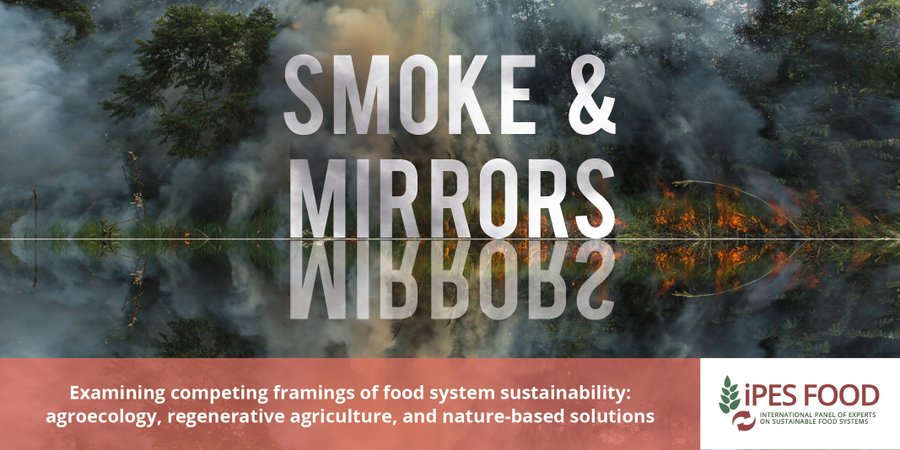In the second IPES briefing note on food systems governance, IPES-Food analyzes three concepts:
Smoke & Mirrors: Examining competing framings of food system sustainability- ‘agroecology’
- ‘nature-based solutions’
- and ‘regenerative agriculture’
These concepts are competing for attention. But, while often grouped together, they can imply very different things. ‘Nature-based solutions’ are rapidly gaining traction in international summits. But the concept lacks an agreed definition and a transformative vision. And it is often bundled with risky, unproven carbon offsetting schemes. The result is dilution of food system transformation.
- ‘Regenerative agriculture’ is less prominent in policy spaces. Sustainable food system actors use it to emphasize regenerating natural resources.
- However leading agrifood businesses (including Walmart, Pepsi and Cargill) are in some cases invoking ‘regenerative agriculture’ in their corporate sustainability schemes, often in conjunction with carbon offsetting schemes, stripped of social justice dimensions.
- ‘Agroecology’, a more comprehensive pathway towards food system sustainability, has been clearly defined through inclusive governance processes. But despite its conceptual maturity, it is sidelined in food systems, climate and biodiversity summits.
IPES-Food calls to reject solutions that lack definitions, exploit ambiguity and mask agribusiness as usual. Getting food systems on the global agenda isn’t enough: we must ensure inclusive global processes based on a shared understanding of food system transformation and a comprehensive (socially and environmentally) sustainable food system vision.
______________________________
______________________________
- This is the second of a series of briefings on global governance of food systems.
- Read the briefing note ( EN )
- Read the IPES-Food and Institute of Development Studies background study ( EN )
______________________________
Read the first briefing IPES (2021) 'IPCC for food'? How the UN Food Systems Summit is being used to advance a problematic new science-policy agenda
Read the first briefing IPES (2021) 'IPCC for food'? How the UN Food Systems Summit is being used to advance a problematic new science-policy agenda
In this briefing note, IPES-Food warns that the UN Food Systems Summit (UNFSS, September 2021) is being used to advance a new mode of decision-making that could exclude many voices in food systems.
27 Oct 2022Watch this workshop for journalists covering food, climate and COP27 — held on Tues, Oct 25th hosted by IPES-Food and A Growing Culture. This diverse panel of farmer, journalist, researcher and scientists unpack the most crucial storylines around food and climate. Further: How can journalists best cover COP27? What proposed solutions are being greenwashed? How can food systems mitigate/adapt, rather than drive climate change?



No comments:
Post a Comment